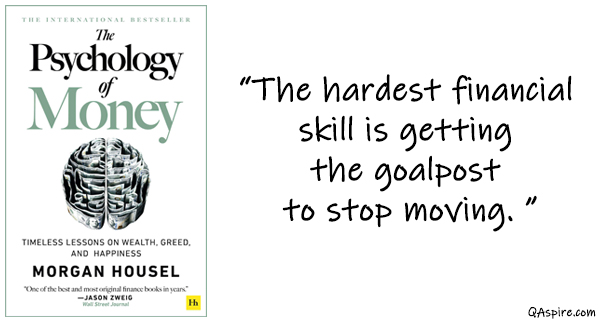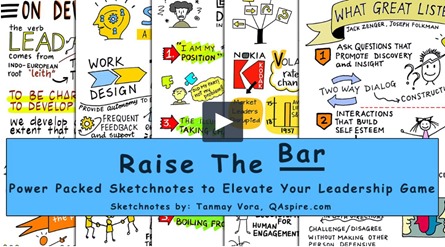Book Review: The Psychology of Money by Morgan Housel
Tanmay Vora

Money is a topic that touches everyone but people rarely open up about their relationship with money – and yet money (and our thinking about it) drives many behaviors and decisions in life.
The Psychology of Money
I recently read Morgan Housel’s brilliant book “The Psychology of Money: Timeless Lessons on Wealth, Greed, and Happiness” with great interest. The book is a fantastic read. Unlike many other financial success books, this one does not try to dish out specific tactics or formulas for financial success but delves into the mental models and behavior that shape a lot of our financial success. The basic premise of the book is:
Doing well with money has a little to do with how smart you are and a lot to do with how you behave. And behavior is hard to teach, even to really smart people. A genius who loses control of their emotions can be a financial disaster. The opposite is also true. Ordinary folks with no financial education can be wealthy if they have a handful of behavioral skills that have nothing to do with formal measures of intelligence.
This book underlines a lot of my own thinking and experiences with money, which is why it resonated all the more. More than the specific insights, I loved the stories that Morgan tells to illustrate his points. Stories make this book a must read and a wise counsel especially for those who are starting out on their journeys.
Here are some of my key takeaway notes and excerpts:
Less ego, more wealth – I loved the insight that saving money is the gap between your ego and your income. Most of our spending on stuff (that feeds our ego) stands in the way of our financial freedom and future options. He adds,
“Modern capitalism is a pro at two things: generating wealth and generating envy. Perhaps they go hand in hand; wanting to surpass your peers can be the fuel of hard work. But life isn’t any fun without a sense of enough. Happiness, as it’s said, is just results minus expectations.”
Spending money to show people how much money you have is the fastest way to have less money.
Manage money in a way that lets you sleep well at night. This is simple insight, yet so profound. If managing your money makes you anxious, fearful or greedy, you may be doing it wrong. He says,
Reputation is invaluable. Freedom and independence are invaluable. Family and friends are invaluable. Being loved by those who you want to love you is invaluable. Happiness is invaluable. And your best shot at keeping these things is knowing when it’s time to stop taking risks that might harm them. Knowing when you have enough.
Longer time horizon means better returns. This too sounds simple but really difficult to pursue. People admire Warren Buffet’s investing skill, but his real secret is time. He started investing at the age of 13 and let compounding work for him.
good investing isn’t necessarily about earning the highest returns, because the highest returns tend to be one-off hits that can’t be repeated. It’s about earning pretty good returns that you can stick with and which can be repeated for the longest period of time.
Money lets you gain control over your time. It is the greatest leverage that money gives.
Money’s greatest intrinsic value—and this can’t be overstated—is its ability to give you control over your time.
That flexibility and control over your time is an unseen return on wealth.
The ability to do what you want, when you want, for as long as you want, has an infinite ROI.
Save, just because you can. People do goal based investing, which implicitly assumes that future is predictable. For an uncertain world, we should save just because we can.
The first idea—simple, but easy to overlook—is that building wealth has little to do with your income or investment returns, and lots to do with your savings rate.
Past a certain level of income, what you need is just what sits below your ego.
Think of it like this, and one of the most powerful ways to increase your savings isn’t to raise your income. It’s to raise your humility.
There is no reason to risk what you have and need for what you don’t have and don’t need. It’s one of those things that’s as obvious as it is overlooked.
Reasonable Strategy is better than Rational Strategy. Reasonable is what works for you. Taking undue risk to optimize every penny of return may not be sustainable in long run. Morgan writes,
My own theory is that, in the real world, people do not want the mathematically optimal strategy. They want the strategy that maximizes for how well they sleep at night.
Intelligence is not a reliable advantage in a world that’s become as connected as ours has. But flexibility is.
Plan, but be flexible. Plans are perfect till they are not. Part of planning in life is to plan for uncertainties, random events and chances. Morgan says,
The only way to deal with them is by increasing the gap between what you think will happen and what can happen while still leaving you capable of fighting another day.
There are a million ways to get wealthy but there is only one way to stay wealthy: some combination of frugality and fear of losing.
Our aspirations change too. I am no longer passionate about things that excited me once upon a time. We are passionate about money in the early part of our careers, but usually our motivations change as we progress in life and look for things like connection, meaning and purpose. Morgan says that people are poor forecasters of their future selves.
Aiming, at every point in your working life, to have moderate annual savings, moderate free time, no more than a moderate commute, and at least moderate time with your family, increases the odds of being able to stick with a plan and avoid regret than if any one of those things fall to the extreme sides of the spectrum.
Know your game. When it comes to investing, people usually take cues from others and blindly follow without having understanding of their context. It helps to understand that even people who invest in same instruments may be playing a different game. Morgan says,
Beware taking financial cues from people playing a different game than you are. A takeaway here is that few things matter more with money than understanding your own time horizon and not being persuaded by the actions and behaviors of people playing different games than you are.
True Success is.. is exiting some rat race to modulate one’s activities for peace of mind. That quote from Nassim Nicholas Taleb summarizes it all.
My Own Practice
I loved the book because my own practice overlaps some of the insights presented in the book. Here’s what works for me in broad sense of things:
Voluntary Simplicity: I aim to live simply and frugally. The pursuit of simple has led me to make simpler choices about what and how much I consume. This has enabled me to live happily in all situations – abundant and scarce. Simplicity breeds clarity. Nicholas Bate says that we chase standard of living when what we really want is quality of life.
Savings Ratio: One thing that has remained a constant pursuit irrespective of income level is focus on savings. Early in life, I was taught to “pay yourself first” i.e. spend after saving. I remember saving from my pocket money as a kid. Voluntary simplicity combined with spending in getting experiences rather than stuff aids saving.
Zero Debt: My pursuit of being debt free as early as possible is single most rewarding financial decision that enables me to sleep well at night. My theory is that borrowing money for building assets (that earn more) may be a smart decision, but borrowing any money to pay your bills is the recipe for disaster.
Real Success: A lot of people confuse more money with winning. But winning at any cost is not everything. Making a positive difference around us is. Being generous and kind is. Money enables me to be more of myself, do what brings me joy and makes a positive difference around me.
Visual Leadership Pack of HD Sketchnotes
Elevate your leadership and learning game with 68+ Powerful Ideas in form of Sketchnotes. Check out the Visual Leadership Pack of HD Sketchnotes here.
